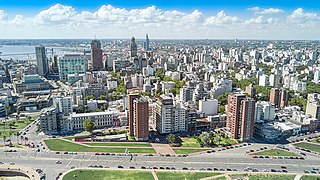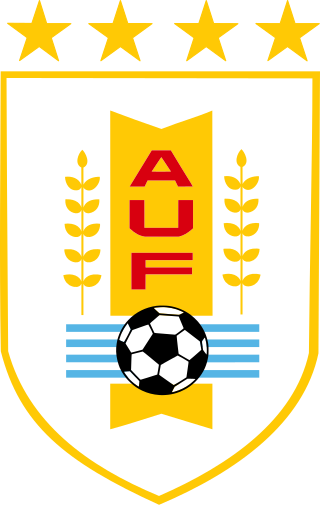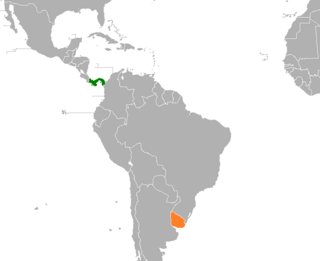 |
|---|
General elections were held in Uruguay on 25 November 1920 to elect three members of the National Council of Administration and six of the 19 members of the Senate.
 |
|---|
General elections were held in Uruguay on 25 November 1920 to elect three members of the National Council of Administration and six of the 19 members of the Senate.
| Party | Votes | % | Seats | |
|---|---|---|---|---|
| Colorado Party | 93,176 | 52.15 | 2 | |
| National Party | 85,492 | 47.85 | 1 | |
| Total | 178,668 | 100.00 | 3 | |
| Source: Bottinelli et al. [1] | ||||
| Party | Votes | % | Seats | |
|---|---|---|---|---|
| Colorado Party | 26,632 | 50.32 | 4 | |
| National Party | 26,290 | 49.68 | 2 | |
| Total | 52,922 | 100.00 | 6 | |
| Source: Bottinelli et al. [1] | ||||

Uruguay, officially the Oriental Republic of Uruguay, is a country in South America. It shares borders with Argentina to its west and southwest and Brazil to its north and northeast, while bordering the Río de la Plata to the south and the Atlantic Ocean to the southeast. It is part of the Southern Cone region of South America. Uruguay covers an area of approximately 176,215 square kilometres (68,037 sq mi). It has a population of around 3.4 million, of whom nearly 2 million live in the metropolitan area of its capital and largest city, Montevideo.

This article deals with the diplomatic affairs, foreign policy and international relations of Uruguay. At the political level, these matters are officially handled by the Ministry of Foreign Relations, also known as Cancillería, which answers to the President.

Montevideo is the capital and largest city of Uruguay. According to the 2011 census, the city proper has a population of 1,319,108 in an area of 201 square kilometers (78 sq mi). Montevideo is situated on the southern coast of the country, on the northeastern bank of the Río de la Plata.

The Colorado Party is a liberal political party in Uruguay.

The Uruguay national football team, nicknamed La Celeste, represents Uruguay in international men's football, and is administered by the Uruguayan Football Association, the governing body for football in Uruguay.

The Socialist Party of Uruguay is a socialist political party in Uruguay. Founded in 1910, it is part of the Broad Front political coalition and the Progressive Alliance.

The Communist Party of Uruguay is a communist party in Uruguay, founded on 21 September 1920 by members of the Socialist Party who had endorsed the October Revolution and the Bolsheviks.

The Chamber of Representatives is the lower house of the General Assembly of Uruguay. The Chamber has 99 members, elected for a five-year term by proportional representation with at least two members per department.

The General Assembly of Uruguay is the bicameral legislature of the government of Uruguay, and consists of two chambers: the Chamber of Senators and the Chamber of Representatives. General Assembly has 130 voting members: 99 representatives and 30 senators, the Vice President of the Republic, who serves as President of the General Assembly, and the Senate has the right to vote. The legislature meets in the Legislative Palace in Montevideo. Both senators and representatives are chosen through proportional representation for five-year terms.

The Bank of the South or BancoSur is a monetary fund and lending organization established on 26 September 2009 by Argentina, Brazil, Paraguay, Uruguay, Ecuador, Bolivia and Venezuela with promises of initial capital of US$20 billion. Argentina, Venezuela, and Brazil were to have each pledged $4 billion, and Uruguay, Ecuador, Paraguay and Bolivia were to have contributed smaller amounts. The bank intended to lend money to nations in the Americas to construct social programs and infrastructure. Documents establishing the bank as an entity were signed in 2007, and the agreement between the countries was finalized in 2009, but as of 2016, the bank had not been capitalized.

Spain–Uruguay relations are the current and historical relations between Spain and Uruguay. There is community of 67,000 Spanish nationals residing in Uruguay and 33,000 Uruguayan nationals residing in Spain. Both nations are members of the Association of Spanish Language Academies, Organization of Ibero-American States and the United Nations.
Sudamérica Rugby, is the governing body for rugby union within South America and most of Central America. It was created on 14 October 1988 in Asunción on the initiative of Argentina, Brazil, Chile, Paraguay, and Uruguay, counting with a total of 16 unions.

Panama – Uruguay relations are bilateral relations between Panama and Uruguay. Both countries are members of the Organization of American States.
The Uruguayan Athletics Confederation is the governing body for the sport of athletics in Uruguay. As of 2019, Its president is Marcos Melazzi.

The Uruguayan departments are subdivided into municipalities and, as of 2023, there are 127 municipalities. This second level administrative division system was created by Law No. 18567 of 13 September 2009 and the first municipalities were created in March 2010. In the municipal elections of 2010 municipal authorities were elected for the first time and they assumed office months later.
The system of orders, decorations and medals of Uruguay consists of both military and civilian honours presented by the authorities of Uruguay with the purpose of recognising and rewarding actions or services considered praiseworthy.
Anarchism in Uruguay held a major importance in the organization of the labor movement. The history of the libertarian movement in Uruguay was closely linked to issues circulating internationally: the immigration of Spanish and Italian workers in particular had a major influence in its development, but the relations between revolutionary movements across Latin America, and in particular with Argentina and Brazil were equally significant.

Julio Daniel Salinas Grecco is a Uruguayan neurologist and politician of Open Cabildo (CA), who served as Minister of Public Health of Uruguay from 1 March 2020 to 13 March 2023.